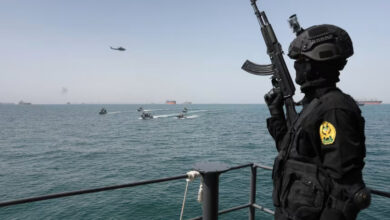
BEIRUT (Reuters) – As Syrian President Bashar al-Assad attempts to turn military success into postwar reconstruction, Western sanctions are a major obstacle that could scare off foreign companies.
Syria has suffered immense physical destruction, while millions of workers have fled, been conscripted or killed. A UN agency estimates the war has cost $388 billion.
Extensive reconstruction still looks far off. Assad’s allies Russia and Iran, as well as China, have made some investments in the country, but they cannot afford the cost of rebuilding and want other countries to share the burden.
Western countries say they will not approve reconstruction funding for Syria, or drop sanctions, without a political settlement. Meanwhile, sanctions are making it hard for foreign companies to work there.
Although some have managed to do business in Syria, the wide scope of the sanctions and broad US powers to enforce them mean companies risk inadvertent breaches.
Most Western companies are steering clear. One that hopes for future work in Syria, German pipe manufacturer Ostendorf Kunststoffe, exhibited at an international trade fair in Damascus and is building relationships with potential customers.
However, it has not agreed any contracts yet and its local representative, Nabil Moughrabie, based in Beirut, said the company was waiting for the political climate to clear.
“We have obstacles. There isn’t any direct shipping from Germany to Syria. There are Syrian banks that cannot receive any money from Europe, and European companies that are afraid to receive any more from Syria,” he said.
Sanctions extended
US sanctions on Syria predate the crisis, but were extended after Assad’s crackdown on protests in 2011 and again as the country slid into war.
The sanctions have frozen the assets of the Syrian state and hundreds of companies and individuals, including government figures, military and security personnel and others accused of involvement in making or using chemical weapons.
They ban exports, sales or supply of services, along with any new investments, into Syria by any US person. They also bar any dealings by US persons in Syrian oil and hydrocarbon products, or their import into the United States.
US persons cannot finance or facilitate any transactions by foreigners that would fall under sanctions if done by Americans.
European Union sanctions were imposed in May 2011, for Syria’s “brutal repression and violation of human rights”, and have been updated several times since.
They are not as sweeping as the US sanctions, but are still extensive and include asset freezes, travel bans, trade restrictions, financial sanctions and an arms embargo.
They bar trade in items that could be used militarily or for repression, luxury goods, precious stones and metals and equipment or technology for some oil and gas sectors including exploration and production, refining and gas liquefaction.
The European sanctions also target Syria’s electricity network, banning EU companies from building power plants, supplying turbines or financing such projects.
US and EU sanctions include exceptions for humanitarian supplies, and for items needed by United Nations missions in Syria.
The EU also allows companies to carry out work in the energy and power sectors covered by contracts signed before the sanctions were imposed.
Sanctions enforced
“It’s not for the faint hearted,” said Anna Bradshaw, a partner at law firm Peters & Peters in London, who advises on sanctions.
US rules pose a bigger risk to companies involved in Syria than EU ones, she said.
American authorities have pursued violations more assiduously than the EU, where enforcement may be complicated by differences among its 28 states in how to interpret rules and penalties.
US sanctions, besides being wider in scope, have a longer reach: American jurisdiction extends to the worldwide activities of all “US persons”.
That term includes both American citizens and companies, as well as US permanent residents and under some sanctions programs – at present not including Syria – foreign subsidiaries of American firms.
In April, US authorities arrested a Bulgarian man working for the Bulgarian office of a US company in a Syrian-related sanctions case for which three Americans were jailed in December.
Washington does not only target US sanctions violators. It can also blacklist foreign companies or people who help others to skirt sanctions – naming them as foreign sanctions evaders barred from most business with Americans.
Main risks
Non-US companies risk trouble if any part of a transaction involves Americans or American companies.
“If you do something that causes someone else who is subject to US jurisdiction to violate US sanctions, then you are on the hook as well,” said Bradshaw.
Even diligent companies might inadvertently fall foul of the asset freezes by dealing with a listed individual or entity in Syria’s opaque business climate.
That risk has grown as Assad has consolidated control, Bradshaw said: “The people who will be commissioning the reconstruction efforts and the people in charge are likely to be the very people targeted by financial sanctions.
“The more you can demonstrate that your due diligence is reasonable, the better chance you have of persuading the authorities that they shouldn’t pursue you,” she said, warning it may not always be possible to spot that a counterparty is sanctioned.
Syrian Finance Minister Mamoun Hamdan told Reuters last week that the sanctions were unjust because they affected ordinary people as well as the government and army.
Despite the humanitarian exemptions, sanctions have hit Syrian healthcare, the World Health Organization’s Syria representative Elizabeth Hoff said.
Sanctions affected procurement of some medicines by preventing transactions with foreign banks and stopping many international drug companies from dealing with Syria, she said.
Reporting By Angus McDowall; Additional reporting by Hans Seidenstuecker; Editing by Giles Elgood.




